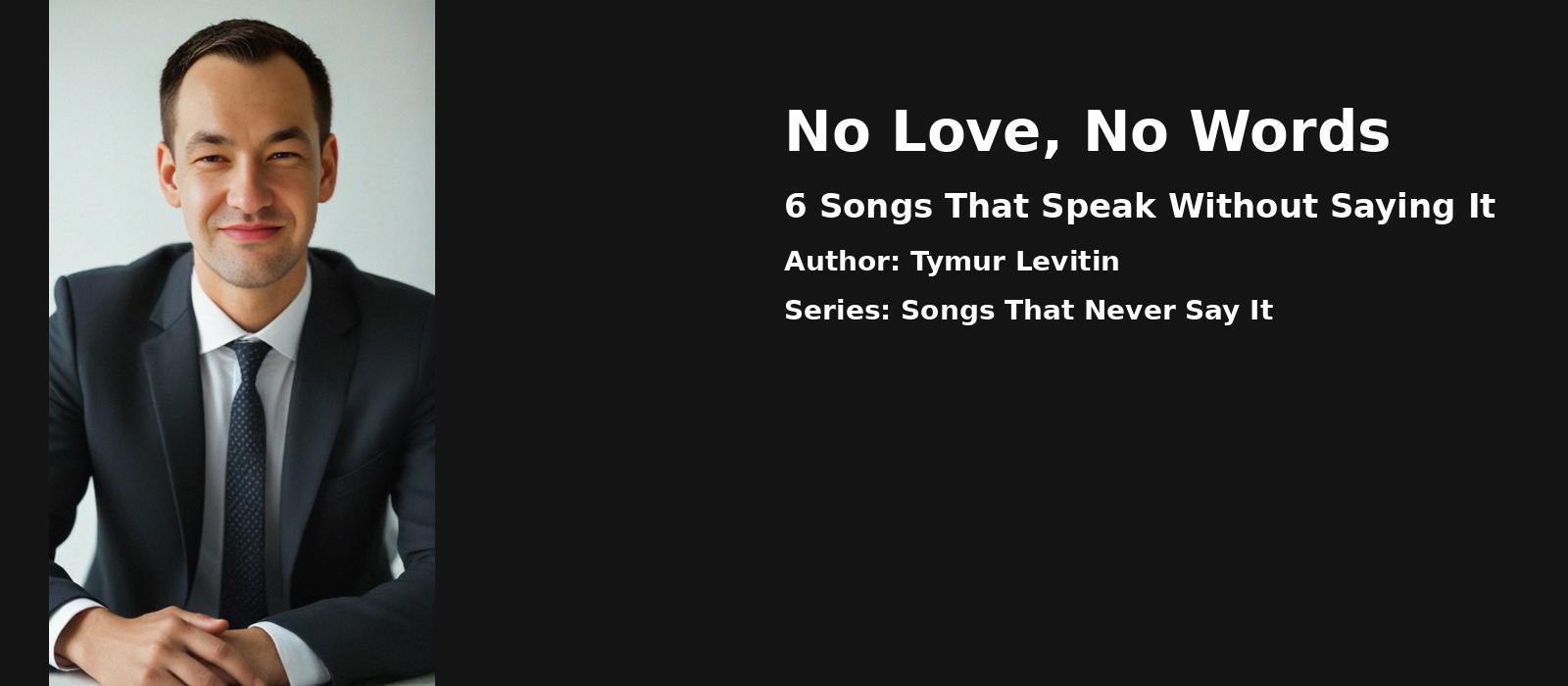Author’s Column by Tymur Levitin
Series: Songs That Never Say It — But Mean Everything
Real Language. Real Feeling. No Gloss.
There are songs where the word “love” is never said — and yet they are the most powerful love songs I’ve ever heard.
As a teacher and translator, I’ve spent years working between languages and across cultures. And I’ve learned that in language, as in life:
Real feelings rarely use names.
Real language is never literal.
This article is not about lyrics. It’s about what remains when the lyrics stop. About how grammar, silence, rhythm, and cultural memory can say what words cannot.
Let’s look at six songs — from six genres and eras — that speak without saying “I love you.” And yet, they say everything.
1. Александр Серов — «Давай друг друга украдём» (Let’s Steal Each Other)
A Soviet-era pop ballad with not a single mention of love.
And yet, it’s all there.
Давай друг друга украдём
Let’s steal each other
The verb “украдём” (let’s steal) is impulsive, physical, and decisive.
This is not emotional pleading. This is action.
It echoes the cinematic tradition of the late USSR — where emotion wasn’t explained, it was acted upon.
2. The Beatles — Yesterday
The most famous heartbreak in modern music. And it doesn’t tell us anything.
Yesterday, all my troubles seemed so far away…
There’s no “I love you.” No “you left me.”
Just a time shift. And that’s where the emotion lives — in the past tense.
English doesn’t need to name pain. It just moves it into yesterday.
And in teaching, that’s what I show: grammar can carry grief.
3. Nirvana — Where Did You Sleep Last Night
A 19th-century Appalachian murder ballad, reimagined by Kurt Cobain.
Where did you sleep last night?
In the pines, in the pines, where the sun don’t ever shine…
The question sounds simple. But it carries fear, betrayal, collapse.
Cobain doesn’t reinterpret the lyrics — he lets them devour him.
It’s not a performance. It’s a breakdown.
Translation isn’t about words. It’s about wounds.
4. Михаил Круг — «Это было вчера» (That Was Yesterday)
Not a prison ballad — a farewell without anger.
A man remembering what can’t return.
Я прощался с тобой, говоря тебе «здравствуй»
I said goodbye by saying hello.
This paradox is deeply Russian: emotion is encoded in contradiction.
The song is built on silence, rain, autumn leaves — the landscape of a man who won’t explain, but won’t forget.
5. Михаил Круг — «Давай поговорим, а нас с тобой потом»
(Let’s Talk — and Leave “Us” for Later)
Here, love is not claimed or fought for.
It’s postponed.
Давай поговорим, а нас с тобой потом
Let’s talk — and deal with “us” later.
A student once asked: “What does that mean?”
And I answered:
“We both know it’s over. But we want one last moment before admitting it.”
This is emotional pause — not closure. And that, too, is language.
6. Виктор Салтыков — «Нежные локоны» (Tender Locks)
This is a song of pre-love.
Of beauty not touched, only imagined.
Нежнее, чем ландыш душистый,
Когда он в другого влюблён…
Softer than a lily in love with someone else…
The lyrics build endless metaphors. Like a poem from Russia’s Silver Age.
You don’t translate this.
You let students feel it — line by line, like falling petals.
Where These Songs Come From — Cultural and Literary Origins
1. “Давай друг друга украдём”
Rooted in late-Soviet realism, where emotion is action, not dialogue.
2. Yesterday
Structured like an English folk lament. Memory carried by tense.
3. Where Did You Sleep Last Night
A murder ballad passed down from Appalachian oral tradition.
4. “Это было вчера”
Not criminal — lyrical. A masculine goodbye in metaphors of nature.
5. “Давай поговорим…”
A cinematic final scene — one that never finishes, only fades.
6. “Нежные локоны”
A poetic construct, close to Balmont or early Pasternak — a linguistic caress.
Final Thought
I don’t teach songs.
I teach how to read between them.
How to hear meaning in grammar.
How to feel memory in a verb.
How to translate silence.
Because this is what real language is made of.
And this is where real connection lives.
—
© Tymur Levitin
Founder & Director of Levitin Language School
Speak Free. Learn Smart.
languagelearnings.com
levitinlanguageschool.com
Related reading from our blog:
- Stop Memorizing. Start Thinking.
- Grammar Is Not Math
- You Can’t Read It — That’s Why You Should Try
- Choose Your Language














